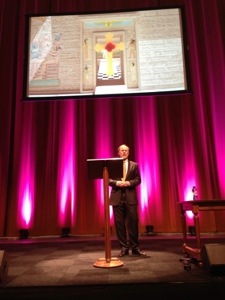M.A., California Institute of Integral Studies (philosophy and religion), 2000.
M.S., University of Washington (mathematics), 1994.
B.S., Stanford University (physics), 1988.

Thomas J. McFarlane (1964-) is a partner at a Silicon Valley patent firm and the author of Einstein and Buddha: The Parallel Sayings (Ulysses Press, 2001). Currently, he serves as the publications director at the Center For Sacred Sciences in Eugene, Oregon, where he is also one of the Center’s spiritual teachers. Thomas is a speaker and the author of numerous articles relating to physics, mathematics, and philosophy.
He was raised in a La Grande, Oregon and graduated from La Grande High School at the top of his class in 1983. After graduation, he was awarded a presidential scholarship to attend the University of Oregon where he was accepted to the university’s Honors College. After two years there, he transferred to Stanford University where he majored in physics and graduated with distinction in 1988. In 1991 he entered the graduate program in the Department of Mathematics at the University of Washington, graduating in 1994 with a master of science degree specializing in knot theory and abstract algebra. He then became a US Patent Agent and founded a Silicon Valley patent firm. From 1997-2000 he attended the graduate program in Philosophy, Cosmology, and Consciousness at the California Institute of Integral Studies, earning a master of arts degree in philosophy and religion.

Roger Prentice
3 June 2020
Tried to ask this question on Quora Tom. Are the aphorisms in your paper here – https://integralscience.wordpress.com/1998/12/20/the-nondual-philosophy-of-franklin-merrell-wolff/ like haiku – that is to slip under the radar of the judging mind? If not what is the purpose of their brevity?
integralscience
3 June 2020
According to Wolff himself, the aphorisms can be used in at least two ways. First, they can be used as seeds for meditative contemplation, pointing consciousness to a realization beyond conceptualization. Second, they can be used as provisional hypotheses upon which to build a world view that can be lived to see whether they provide a beneficial framework for life. I would encourage you to read his book The Philosophy of Consciousness Without and Object for more discussion from Wolff himself. That volume has been republished in the book Experience and Philosophy.